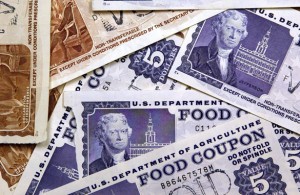WASHINGTON, D.C. – House Minority Whip Steny Hoyer (D-Md.) believes the quickest and surest road to economic recovery is more in people’s pockets. More food stamps and unemployment check that is.
 When reporters at a Capitol Hill briefing asked Hoyer if Democrats are “reconsidering the wisdom” of letting the Bush tax cuts expire at the end of the year for top income he changed the subject to government assistance. “I haven’t talked to any who are of that mind,” said Hoyer. “If you talk to economists, they will tell you there are two things that are the most stimulative that you can do — one’s unemployment insurance, the other’s food stamps, okay?”
When reporters at a Capitol Hill briefing asked Hoyer if Democrats are “reconsidering the wisdom” of letting the Bush tax cuts expire at the end of the year for top income he changed the subject to government assistance. “I haven’t talked to any who are of that mind,” said Hoyer. “If you talk to economists, they will tell you there are two things that are the most stimulative that you can do — one’s unemployment insurance, the other’s food stamps, okay?”
“Why is that?” he said. “Because those folks who receive those resources must spend them. And they’ll spend them almost upon receipt. Most economists with whom I talk believe that those with significant discretionary income, that that’s not the case.”
Unless action is taken by Congress, the Bush tax cuts will expire on Jan. 1, 2013. Originally enacted in 2001 and 2003, President Barack Obama and Congress renewed the cuts for all income-brackets for two years in 2010. Now Democrats are proposing the rates be extended for one more year, until the end of 2013, for people earning less than $250,000 a year. Republicans, on the other hand, are calling for the rates to be extended to people of all income brackets.
The Congressional Budget Office has projected that if the Bush tax cuts are allowed to expire at the end of 2012, it will lead to a 1.3 percent contraction in GDP after Jan. 1, 2013. Long term projections are conclusive that allowing those tax cuts to expire coupled with a scheduled round of automatic spending cuts will throw the U.S. economy into a nose dive. The CBO warns that allowing the GDP to fall any further is like pushing the struggling economy off a”fiscal cliff”.
On January 1, 2013 higher tax rates will kick in and $100 billion in automatic budget cuts are now mandated by law. Lawmakers are expected to head off a shift in the government’s financial situation later this year or in early 2013, but the CBO says if nothing is done it would likely push the US economy into yet another recession and wrest hundreds of billions of dollars from the budget deficit. Last summer’s debt and budget agreement imposed almost $1 trillion in cuts to agency budgets over the coming decade and required automatic cuts of another $1 trillion or so.
The CBO study comes as Congress is gridlocked over spending and taxes in advance of the fall elections. The White House and top Democrats are refusing to act on the expiring tax cuts and automatic spending cuts unless Republicans show greater flexibility on raising taxes.
Until long-term solutions are enacted and scheduled to be voted on out of the limelight of national elections we are likely to continue to see stop-gap measures that lead to even more economic gridlock.
©2012 Off the Grid News
 Off The Grid News Better Ideas For Off The Grid Living
Off The Grid News Better Ideas For Off The Grid Living



